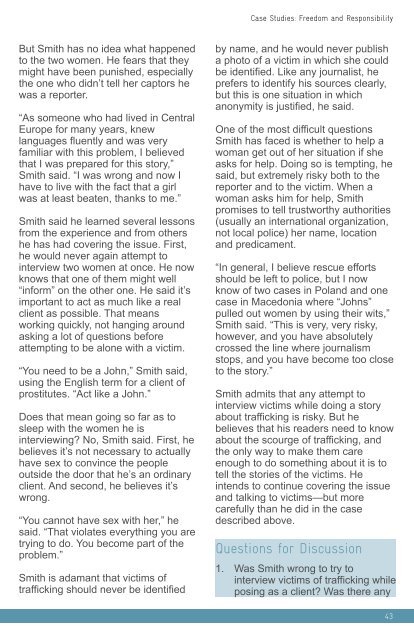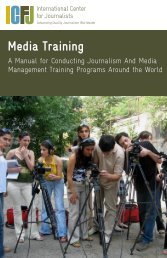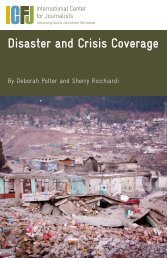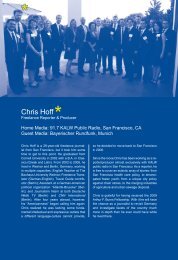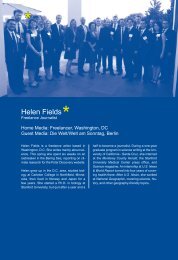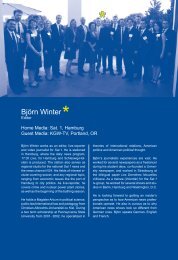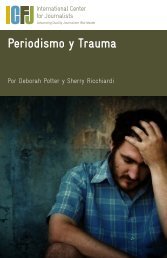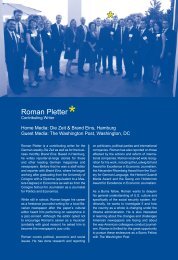Download PDF - International Center for Journalists
Download PDF - International Center for Journalists
Download PDF - International Center for Journalists
Create successful ePaper yourself
Turn your PDF publications into a flip-book with our unique Google optimized e-Paper software.
Case Studies: Freedom and Responsibility<br />
But Smith has no idea what happened<br />
to the two women. He fears that they<br />
might have been punished, especially<br />
the one who didn’t tell her captors he<br />
was a reporter.<br />
“As someone who had lived in Central<br />
Europe <strong>for</strong> many years, knew<br />
languages fluently and was very<br />
familiar with this problem, I believed<br />
that I was prepared <strong>for</strong> this story,”<br />
Smith said. “I was wrong and now I<br />
have to live with the fact that a girl<br />
was at least beaten, thanks to me.”<br />
Smith said he learned several lessons<br />
from the experience and from others<br />
he has had covering the issue. First,<br />
he would never again attempt to<br />
interview two women at once. He now<br />
knows that one of them might well<br />
“in<strong>for</strong>m” on the other one. He said it’s<br />
important to act as much like a real<br />
client as possible. That means<br />
working quickly, not hanging around<br />
asking a lot of questions be<strong>for</strong>e<br />
attempting to be alone with a victim.<br />
“You need to be a John,” Smith said,<br />
using the English term <strong>for</strong> a client of<br />
prostitutes. “Act like a John.”<br />
Does that mean going so far as to<br />
sleep with the women he is<br />
interviewing? No, Smith said. First, he<br />
believes it’s not necessary to actually<br />
have sex to convince the people<br />
outside the door that he’s an ordinary<br />
client. And second, he believes it’s<br />
wrong.<br />
“You cannot have sex with her,” he<br />
said. “That violates everything you are<br />
trying to do. You become part of the<br />
problem.”<br />
Smith is adamant that victims of<br />
trafficking should never be identified<br />
by name, and he would never publish<br />
a photo of a victim in which she could<br />
be identified. Like any journalist, he<br />
prefers to identify his sources clearly,<br />
but this is one situation in which<br />
anonymity is justified, he said.<br />
One of the most difficult questions<br />
Smith has faced is whether to help a<br />
woman get out of her situation if she<br />
asks <strong>for</strong> help. Doing so is tempting, he<br />
said, but extremely risky both to the<br />
reporter and to the victim. When a<br />
woman asks him <strong>for</strong> help, Smith<br />
promises to tell trustworthy authorities<br />
(usually an international organization,<br />
not local police) her name, location<br />
and predicament.<br />
“In general, I believe rescue ef<strong>for</strong>ts<br />
should be left to police, but I now<br />
know of two cases in Poland and one<br />
case in Macedonia where “Johns”<br />
pulled out women by using their wits,”<br />
Smith said. “This is very, very risky,<br />
however, and you have absolutely<br />
crossed the line where journalism<br />
stops, and you have become too close<br />
to the story.”<br />
Smith admits that any attempt to<br />
interview victims while doing a story<br />
about trafficking is risky. But he<br />
believes that his readers need to know<br />
about the scourge of trafficking, and<br />
the only way to make them care<br />
enough to do something about it is to<br />
tell the stories of the victims. He<br />
intends to continue covering the issue<br />
and talking to victims—but more<br />
carefully than he did in the case<br />
described above.<br />
Questions <strong>for</strong> Discussion<br />
1. Was Smith wrong to try to<br />
interview victims of trafficking while<br />
posing as a client? Was there any<br />
43


